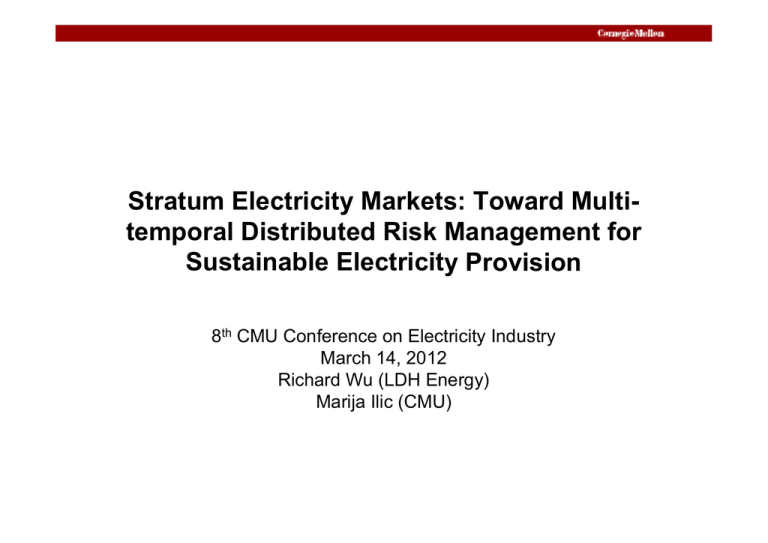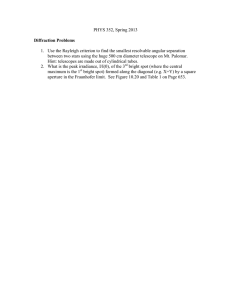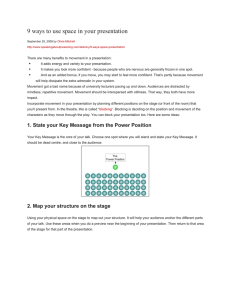Stratum Electricity Markets: Toward Multi- St atu ect c ty a
advertisement

St atu Electricity Stratum ect c ty Markets: a ets Toward o a d Multiut temporal Distributed Risk Management for Sustainable Electricity y Provision 8th CMU C Conference f on El Electricity t i it IIndustry d t March 14, 2012 Richard Wu (LDH Energy) Marija Ilic (CMU) Resource Adequacy • Few investments w/o policy subsidies • The “missing money” problem PJM new entrant net revenue study (PJM 2011) 2 Spot Market Improvements • Restore right spot market price signals – Remove price caps – Encourage demand response • OOM /RMR commitments depress prices – Uplifts are socialized by LSEs Without OOM ● 3 Spot Market Improvements • Pricing reliability: allow RMR units to set LMPs – Modifying the transmission constraints – G1: $50, G2: $100, L1=L2=100MW, line limit 200 MW – RMR: G2 dispatch 10 MW => Line limit 190 MW 4 Capacity Market – Explicit p capacity p y target g with mandatory yp participation p – Administrative demand curve sets the price: • Target capacity level • Cost C t off New N E Entrant t t (CONE) • Net energy and A/S offsets 5 Capacity Market • Administrative demand curve – CONE is based on one new natural gas CT unit – Susceptible to market power • 1% decrease in supply => 20% in price • Rewards with few performance requirements – Commitment obligations don’t necessarily translate to cleared energy – Reverse selection: mothballed unit reactivation and delayed retirements – Uneconomic entrants with subsidies • NJ and Maryland legislations and FERC rulings • Large Renewable Portfolio Standard integration in the future 6 Uncertainties and Risks Supply Demand Fuel Load forecast Location/Permit Smart Meters, DR Smart Grid, DG Electric El ti Vehicles Outages Rates and RTP Regulatory Environmental: CSAPR, CO2 Political: Subsides for Renewable, Cost Allocation Spot market prices too volatile for long long-term term investments 7 Uncertainties and Risks • These factors interplay with each other – Old coal fired generators in western PJM Low Revenues due to congestions Delayed retirements due to capacity payments Expedited retirements due to CSAPR – Accelerated coal plant retirements coincide with large integration off renewable bl resources: llong-term t reliability li bilit iimplications li ti 8 SEM: Market Design A series of sequentially cleared forward markets + Spot markets w/ improvements Market Temporal granularity Spatial granularity Realtime 5-10 minutes Nodal Day-ahead Hourly Nodal Annual Seasonal w/ time of use Zonal forward contract starting at Y+2 Multi-year Seasonal w/ time i off use Zonal forward contract starting at Y+1 1-year L d ti Lead-time Y-1 forward contract starting at Y Y Y+1 Y+2 Y+3 Y+4 9 Market Interactions • Long Long-term term forward contracts are financial – Arbitrages between the markets are allowed – Centralized credit management • Short-term market products are physical – Net long-term long term positions => short short-term term obligations – Penalty for non-delivery – Bids/offers need to be backed up by physical assets • Generators/loads • Confirmed demand response projects • Firm imports/exports at interties 10 Financial Settlement • Incremental settlement rule – Cleared quantity is the sum of all existing layers – Only the difference is settled against the new price 11 Financial Settlements • Example p 1: Arbitrage g by y financial p player: y p price convergence g • E Example l 2 2: iincremental t l offers ff b by Gencos: G risk i k di distribution t ib ti 12 Key Features • Provide right performance incentives – Link performance with rewards (penalties for non-delivery) – Link risks with rewards by promoting forward hedging • Provide flexible platform to manage risks – Forward hedging promotes stability – Risk premium as means to recover the missing money – Feedback mechanism provides price discovery and portfolio realignment – Centralized credit management reduce default risks – Possible natural solution for unit commitment problem 13 Risk Allocation • In regulated industry, consumers bear risk • In deregulated spot markets, investors bear risk • Risks are better managed by those who have more knowledge • Risks should be allocated to the entities who are prepared and able to take that risk • Market rewards “right” g risk taking g with a premium • Risks can be turned into incentives 14 The Bigger Picture • SEM could be expanded to account for other externalities – Transmission congestions: long-term FTR market – Air Pollutant emissions: Cap and Trade emission markets – Fuel price uncertainty: long-term fuel market • A Achieving hi i llong-term t sustainability t i bilit b by addressing dd i multiple risk factors and their interdependence 15 Questions? 16 Market Design • Temporal granularity – Long-term tenor: 3-5 years in advance with necessary lead time for construction – Long-term: seasons with different time of use – Short-term : hourly in DAM and 5-10 mins in RTM • Spatial granularity – Long-term : zonal settlement – Short Short-term term : nodal settlement w/ full network models 17 RA: In Theory • Deregulated industry – Under ideal market conditions, spot market should work – Optimal capacity and technology mix are achieved in a long run equilibrium when profits of marginal units received from energy markets can recover capital and O&M costs – Investors/developers bear the risk Price Price Demand Supply Demand VOLL Demand Scarcity rent Scarcity rent Supply Supply Quantity Quantity 18 Quantity




